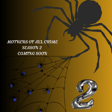Podcast Introduction
00:00:23
Speaker
Hello and welcome to the Mothers of All Crime. This is a podcast where we deep dive into mothers involved in infamous crimes and scandals. I'm Monica and this is Crystal.
Juanita Hoyt Case Introduction
00:00:59
Speaker
Our mother this week is Juanita Hoyt. It's sort of a different kind of case, but I think it's interesting to talk about. Had you ever heard of Juanita Hoyt before we started talking about her for this? I had not known a lot about her, but I definitely had heard her name through the research for our Gypsy Rose episode, but I didn't really go into it.
00:01:28
Speaker
and interesting I think now that we like kind of went into it more I'm now understanding a lot more why those names are associated so I think a little bit of a correlation there but other than that I hadn't really heard much about her because this was a case from a while ago I was busy being born during her trial so yeah I mean I mean this is definitely old I mean Juanita was born in 1946 you know she was she it's It's all old.
Public Awareness and Media Challenges
00:02:00
Speaker
It's definitely all before our time and the dates of what the events that happened and later when this became like a public event are also extremely far apart. So I think that timeline wise, I would be kind of surprised if you'd heard about her a lot.
00:02:19
Speaker
I actually saw her, there's an episode of Deadly Women based on her, um which I tried to rewatch again for, to talk about for this podcast. And it, I can't find season three anywhere of Deadly Women. I have every streaming service possible and season three is not available. So if anyone listening to this has access to season three of Deadly Women, I would love to watch it. Send me an Instagram email.
00:02:47
Speaker
But I'm just, I'm always shocked if there's something I seriously cannot watch, because I feel like we have every streaming option, so it should be available, but I can't find it anywhere. And just that season. but It's just that season. And season one, you can find some of it on YouTube. But season two and season four and beyond, I think there's like 12 seasons, so they're all available on Discovery Plus, Hulu, HBO. ah Season three is nowhere. Weird.
00:03:17
Speaker
Yeah, well be weird well, we'll give our own recap of this deadly woman. Definitely. There are also some good books that have been written about her and her life. And I read one a few years ago, which I am happy to plug.
00:03:32
Speaker
Goodbye My Little Ones by Charles Hickey, Todd Leidy, and John O'Brien. I'd recommend it. There's a few. um There's also The Death of Innocence. These are all on Audible, Amazon. And they're good. They're interesting because it has a lot of interviews with family members. And to me, that's always interesting.
Juanita's Background and Family Dynamics
00:03:51
Speaker
But I guess we should talk about who Juanita Hoyt was, is, and what her timeline looks like.
00:03:59
Speaker
Yeah, so she was born Nixon and ended up getting married, which is where she got her Hoyt last name. And Tim Hoyt, who was her husband, they got married in January of 64. She actually dropped out of high school to get married to him.
00:04:19
Speaker
And I think that kind of just shows the time period difference here, where most of the mothers we've talked about recently, and also in modern days, if people aren't dropping out of high school to get married and start a family, they tend to prioritize their careers a little bit more, particularly women, which is a huge shift from women in the 60s.
00:04:46
Speaker
Oh yeah, definitely. I mean, Juanita grew up very, I don't want to say, I don't know if lower middle class is the right word, but her family was not, did not have a lot of money and they were on a farm and she was the fifth of six kids. So I think that there was some pressure kind of to get married. And also that was kind of the assumption of what she was going to do. And her mother had always said that women were here to be wives, to be mothers. That's how she was raised. She was taught how to do a lot of domestic things growing up. Certainly education wasn't prioritized. I don't think she was ever going to go to college. So I think that for her,
00:05:31
Speaker
getting married was just what you do. um And she was only like 16, which is important. um And when they got married, she did drop out of school and Tim Hoyt was also from a farming family and they didn't have a lot of money. So she moved in with his family and that's where they lived in like the early years of their marriage was with his family. And um So it wasn't like a glamorous newlywed experience. So there was no honeymoon or first place together or anything like that. They were just living in a room at his parents' house on their farm. Yeah. And this was in New York too. And I think if you were talking about New York City, it would surprise me that she moved in with his family. But considering they cant both came from a farming community
00:06:26
Speaker
you worked a lot and you worked for the family farm. So it wasn't super sharp to me that but she went from her family house to her in-laws house just because of the nature of kind of what their families did for a living. And for sure. I mean, maybe the what original thought was we'll just have a place on the property because he's not going to just magically decide to not work the family at such a young age, you have no other options in that kind of area and that timeframe. For sure, definitely. I think it makes a lot of sense. I'm not, I think it made sense for them at the time and I think it was a common thing to do. um But it definitely gave the Hoyts an interesting, they spent a lot of time with Juanita when they first got married because they all lived together. So they were all able to observe her. He has a lot of siblings and
00:07:23
Speaker
they noticed some things with Juanita in the early times of their marriage before any pregnancies or children happened. Like, she had a lot of fainting spells in front of family members. Any time that Tim's attention seemed to be focused elsewhere, Juanita would collapse, um and she would also be sick all of the time with various ailments.
00:07:49
Speaker
um his family I saw one thing that said that his family called it Nitaitis. Every little thing and that they would play a game where they would describe um made up symptoms that they were having and take bets on how long it would take before she was also having those symptoms. So I think for Tim's family, they thought that she was a bit of a hypochondriac and you know there's some weird things going on with Juanita but otherwise they seem like a super loving happy couple like obsessed with each other all over each other yeah and but like how funny as like a family
00:08:32
Speaker
This is why I can't have a hypochondriac as an in-law because I think that's hysterical that they just would like to start talking about sicknesses and just wait for her to suddenly have it. That's awful. Totally not okay, but also very funny. It's very funny. And I do think that it's true for people who have hypochondria or some form of that where they're very scared or they always think they're sick.
00:09:01
Speaker
Anytime you're sick around them, they also have it. So I think that i think that it's funny and it it makes sense. I do think it's significant
First Pregnancy and Family Suspicion
00:09:10
Speaker
also. um And then Juanita got pregnant really quickly after they got married within a couple of months. Yeah. And again, very and very normal for the situation at this period.
00:09:26
Speaker
a lot of people still believed in that very large family dynamic where you have a lot of kids and birth control wasn't supported like socially. And also when you're growing up in a farming area, just like his family and her family, you have kids to work the farm that you need help. So the more kids you have, the more help you have. And it is the young women and I don't know how accurate this is, but I've always been told like the younger you are, the easier it is to get pregnant when you're doing it with intention. So it feels very similar here where it's time to have babies and then very quickly she gets pregnant. I mean, that's, that's definitely true. It's just an unfortunate fact of biology. I mean, after the age of
00:10:18
Speaker
maybe 17, you're way more fertile than you're going to be after 27. And there's a a more steep decline after like 34, 35, 36 in female fertility, but between 20 and 27 is kind of ideal. And some people are fertile much younger than that. And you tend to get pregnant faster and be able to, you know, bounce back faster after having a baby if you have them in your late teens or very early 20s. So it's, I guess it's not surprising that she got pregnant right away. And they had their first child, Eric Hoyt. And this is where the real story kind of starts.
00:11:06
Speaker
um because at first Juanita is really reveling in the attention of being pregnant and having a baby and it's all very exciting and I think that that's fair enough and she's only 18 so she has this baby and Within a couple of months, he has passed away from what was called or suspected to be sudden infant death syndrome. he Juanito was home alone with him. He went to sleep. He never woke up. They weren't able to revive him. He didn't have an autopsy. He was buried. It was very, very upsetting.
00:11:51
Speaker
um But, you know, they're really... wasn't any more to make of that. So Eric was three months old and Juanita was 18.
Suspicious Infant Deaths
00:12:02
Speaker
And they they mourned and they moved on. And they had a second child, James, who they called Jimmy. And he was an extremely healthy child, very active, very boisterous.
00:12:21
Speaker
he um you know, was kind of an answered prayer, and things were going pretty well with that. So they had a third child, Julie, and she was also healthy at birth. Nothing was suspected to be wrong with her at all. um But she only lived for 48 days.
00:12:49
Speaker
and she was home with Juanita and Jimmy and she choked on rice cereal which I'm not an expert but 48 days is not when they start eating
00:13:15
Speaker
You know what I mean? I think that's usually more like, I think the earliest you can do that is four months. Particularly the cereal. At last, like my only thought is that she was feeding James and somehow the other one got ahold of it. But again, like no 40 day old baby is grabbing and putting things in their mouth. They're kind of just big lumps and wiggle.
00:13:44
Speaker
Exactly. So i read multiple I read multiple accounts of that day from what Juanita said happened. And she said that she was feeding Julia a bottle with milk and rice cereal in it. And the baby started to choke. And so she ran out into the street and flagged down someone that was driving by to try to have them help her. um Which it just seems like not Like that doesn't seem, I don't know what I would do in that situation, but I don't think that that's what I would do. I think that I would be trying to dislodge food and I would be calling 911 because this is not, I mean, this is 1968. Like there are phones, you know, you have a home phone in 1968. So it's just, it's a little odd. It's a little odd. And I think it is important to note that people have,
00:14:45
Speaker
very different reactions to like traumatic moments like this of fear and there's a lot of people that just don't know what to do and they panic and look for someone else. But then you have that maternal instinct thing that we always hear about where women have this ability to do things that normally they couldn't when their child's life is at risk.
00:15:11
Speaker
And I agree with you, like your first instinct you would think is to somehow dislike, I might hurt you, but I'm gonna do whatever I can to dislodge whatever's in there if you're choking. Just like the mother likes to mix up a car because her kids underneath it, they're gonna do whatever, for some reason, all of a sudden you can do this, but you're never gonna be able to do it again. So you would think that she would be willing to,
00:15:39
Speaker
be more aggressive trying to get it out of their throat rather than just leaving them unattended. More than one, two. So she has a toddler hanging out, an infant choking, and she's gonna leave both of them unattended to go flag someone down. Sketchy. It seems like a weird reaction. I mean, it is possible that she completely panicked and she flipped out and she just was desperate for someone else to help her.
00:16:10
Speaker
I just, I don't know. It doesn't seem quite, it seems a bit, a couple of things with, couple of things with Julie seem a little bit odd to me. I agree with that. But also, you know, she doesn't have the internet as easily as I have it now where she could just look up when to baby start eating rice cereal mixed with formula or milk.
00:16:41
Speaker
But but it's also it's her third child at this point.
00:16:48
Speaker
It seems like you would know how to feed a baby. But right. And I think timeframe to like, you build communities of other women. And unlike women now, for the most part, don't get me wrong, there's a lot of women that get taught this. But As a parent, your primary goal isn't teaching your daughter how to feed a baby or tend to everything. Your primary goal might be making sure they do their homework and they graduate school and get a job and be responsible for themselves. At this point, there's not a doubt in my mind. She knew how to do it. She knew the age. Because in that period of time, you're taught those things a lot earlier because that's what's expected of you. You're expected to become a mother.
00:17:39
Speaker
So you need to know those things. That's a good point as well. So little weird, but okay. So the family is mourning. Julie is buried. Everyone is absolutely devastated except for, you know, little Jimmy. He's only two years old. So he's not very affected by the Julie, the passing of Julie because he just doesn't really clock what's going on.
00:18:05
Speaker
valid. But and he seems to be a very exuberant child. He runs, he walks, he jumps, he speaks, he plays hard. And then a couple of weeks after Julie passed away, Juanita said that he started bleeding out of his nose, and he collapsed. And he died.
00:18:36
Speaker
again. So we're on baby number three who has passed. Of the third to pass. Strange. Of the second born. Yes. So he is the oldest ah of her children so far. But yes, a couple weeks after his baby sister dies, he is mysteriously dead. And this is the first time one of the children got an autopsy, because
00:19:07
Speaker
It's just such a bizarre event and an autopsy did not demonstrate any bleeding or hemorrhage in the brain or skull. And they weren't really able to point to a specific cause of death for Jimmy. There were notes that his adrenal glands were undersized and that his thalamus was oversized.
00:19:34
Speaker
But I think that it's been later shown that the person doing his autopsy, the coroner actually had his age wrong, and thought that Jimmy was supposed to be four instead of two. And the thalamus does not like, and that would make sense that his adrenals are undersized and his thalamus oversized because a two year old should have a larger thalamus than a four year old. So I think that there's really nothing wrong with him on the autopsy. And that his adrenal glands were not undersized. He just is two years younger. But there is no cause of death. That's determined. Just undetermined.
Medical and Family Interventions
00:20:19
Speaker
Yeah, I read somewhere that due to it being undetermined, they ended up classifying it also as SIDS, similar to Eric's for cause of death, because they just couldn't figure out what it is. And SIDS is one of those things that I think gets blanketed where, unfortunately, sometimes things just happen. And even now, with all the advancements we've had since this point, the late 60s, early 70s, we still have incidents where they just don't know why something happened. And I think back then too, when you had even less knowledge than we do now and less tests, Sid's got a lot of cases where it was just hands thrown up, no idea. Here we are.
00:21:14
Speaker
Yeah, because SIDS is not really a diagnosis. It's if there is no other cause found. And now there's something called sudden child death syndrome, which is similar to SIDS, but it's for children that are older, because SIDS doesn't really apply, but that term had not been, like it hadn't been differentiated.
00:21:37
Speaker
right at that point. So it was just all kind of blanketed like, at sids it says it says it says it's a respiratory issue, essentially. um But this is the point where some of Tim's family members started to think that it was very strange. And that wanting a story about what happened with Jimmy didn't really make sense.
00:22:07
Speaker
And it is it is not the same pattern as the other ones for sure. So I think it, you know, nothing. It's very tragic. It's very sad. I think the family was absolutely devastated. They were very involved with Jimmy. And this is a point where there started to be some changes in feeling.
00:22:32
Speaker
Family members were telling them not to have more children. you know This is clearly not working out for you guys because now three of their three children have passed away. And this is the first time that family members started to think that maybe Juanita had some sort of factitious disorder. It's not what they called it then, but it's what we understand it to be now. Where is this being imposed on the children?
00:22:59
Speaker
And Tim absolutely did not think that to be the case. And Juanita was not saying that that was the case. so And these were classified as medical deaths, tragedies. But I think it's caused a bit of a shift in the family at that point. Absolutely. We also had a lot of doctors coming in saying that there could be some kind of genetic component to it.
00:23:27
Speaker
and if you're passing this down to your children and from a family perspective, it's just inevitable that your next kid's gonna have another issue. If you have three thus far having problems and doctors questioning if it's a genetic component, why would you risk A, the heartache, but also bringing another human into this world just for them to have their life be over before they're even three?
00:24:00
Speaker
So I can see the perspective that his family's having with all the different components kind of put together. Yeah, absolutely. But they were not deterred. And they immediately started trying to get pregnant again. And Juanita had a miscarriage. And then they applied to adopt and ended up withdrawing that application because they got pregnant with the fourth child, Molly. And at that point, they started doing some very extensive medical testing on Molly. She was had extensive tests done before leaving the hospital that were all normal. And then she had a spell of apnea, sleep apnea, at home with Juanita.
00:25:00
Speaker
who brought her to the hospital. And then the second she was at the hospital, her testing was all normal, she was released. And then she went home and she had another sleep apnea spell. Juanita had to do CPR. And um she went to the hospital and no cause for that was found.
00:25:29
Speaker
And Molly was maybe three months old, give or take, three, four months old at this point. So it's not like this was, they had a kid and this happened a couple of years later. This happened almost immediately after her giving birth. There started to be issues. Right. And this is where a very important figure um in this case and in SIDS in general comes into play. Dr. sny Stein Schneider is a,
00:25:59
Speaker
A medical researcher has written many articles about sun ni infant death syndrome and he was doing a large study about the relationship between sleep apnea and SIDS and Molly became a patient in his trial and she was monitored for sleep apnea and all of her testing was normal there as well.
00:26:27
Speaker
So she was monitored, monitored, monitored. And her testing was all normal.
00:26:35
Speaker
Which again, in and flag of because it's hard to look at it when you have all these incidents and someone's saying something is wrong, but your tests are coming back normal. You have this middle ground where you As a doctor question, okay, so then what's going on? If all these are normal, but this is the result, something has to be going on. And if something is going on, it can be extremely frustrating, but also there is the alternative that there's something more suspicious going on, I think is that what I want? Versus a medical concern.
00:27:21
Speaker
Yeah, absolutely. Because they are at this point, really taking a lot of steps to determine a medical cause so that this tragedy does not happen again in this family because they have been through unimaginable horrors. And so there's an entire team of people really trying to determine if there's something that is wrong, something that can be fixed. And Molly is passing all tests at the hospital. She seems totally fine while she's there. She did have a couple of incidents where the nurses were like tapping her feet to make sure that she was in a good breathing rhythm. Babies do
00:28:04
Speaker
sometimes have pauses in breathing that's not necessarily deadly or sleep apnea, um but nothing requiring major intervention happened at the hospital. There were some nursing notes that were released later that said that Juanita seemed very detached and distant from Molly and I think that that could be very understandable because she had suffered so much and had to grieve her other children. So it would be, I would think, very difficult to be attached. Yeah. But it drew some attention. Yeah, I think there's a multitude of concerns there where you have the history of her other children, the possible fear of something happening to this child.
00:28:56
Speaker
but also that sometimes like postpartum that you just gave birth and you're trying to figure all this out like there could be a number of reasons and it's very easy in retrospect to look back and be like oh yeah well she was acting weird because she was attached versus in the moment of just being kind of figuring out what's happening so I don't know. I took that one with a grain of salt, just with the circumstance, because this is all happening very quickly. So I don't know. I know what happens, so I don't, I i get it. but like yeah for sugar yeah I just think it's interesting that it was mentioned in the notes at all.
00:29:48
Speaker
It must have been pretty apparent for it to be something that they felt had to be included in nursing notes. It's not extremely relevant otherwise.
00:30:01
Speaker
But I don't know, maybe she just you know had very nosy nurses that were all up in her business. Also possible. Yeah, um i mean some people are like that. So she was in a little cycle of being at the hospital, being at home, having sleep apnea spells, and going back to the hospital.
Tragic Cycle Continues
00:30:22
Speaker
um And she was not having any of these spells in the hospital, as I already said. And two days after being released from the hospital, Molly passes away. She's home alone with Juanita, suffers a spell, they're not able to bring her back.
00:30:44
Speaker
and there's no cause of death listed on her autopsy. Again, devastating rule. This is unsure, like two months old, just a bunch of question marks.
00:31:03
Speaker
So normal people would think that that would deter you from having children again or taking some time to kind of process another death in your home and another death to one of your very very your baby basically but not for her yeah they actually applied to adopt again and then she almost immediately becomes pregnant again I know, but life that's what I'm saying. Yeah. It's like not only were they trying to get pregnant immediately, they also were applying to adopt. It was, which I think can be, I want to look at it with like a little bit of empathy as well, because I don't think, I don't think children are replaceable. I don't think loved ones that die can be replaced. But I do think
00:32:02
Speaker
losing a child or losing a pregnancy, a lot of times a normal reaction is to want to have another child or another pregnancy, not to replace them, but just to fill their arms, fill their home, fill their hearts. You know, it's... And we've seen that a couple times with other cases we've talked about where something tragic happens and more children end up coming into the picture. Because it can be a healing side, but When you have a, quote, genetic concern, you would think that they would stop going for the biological side and just focus on the adoption side.
00:32:47
Speaker
That would have been different for sure. That would have changed, maybe would have maybe changed things a little bit. um We'll revisit adoption, but she did get pregnant again.
00:32:58
Speaker
with baby Noah, turns out. And he became a new patient in the SIDS clinic that Dr. Schneider is running. And he is there for his entire first month of life. He had 800 consecutive hours of monitoring, all normal.
00:33:23
Speaker
And he went home for one day and had a sleep apnea spell, needing CPR. And he went back to the hospital for a weeks.
00:33:36
Speaker
It's just, a yeah. Yeah. All right, I know what's happening. I know what's coming, but go ahead. Well, I was gonna say that Tim at that point decided to get a vasectomy because he was like, this is genetic. This is a problem with us. And I'm not gonna do this anymore. And so he got a vasectomy. So Noah would be the last biological child they would have. I just can't believe it took them
00:34:10
Speaker
five children for him to make this determination. That's what I think is wild to me. I think it's wild too. I think probably would have been better to do that earlier, but you know. Number two, this is clearly not for us. why I'm to lose. Yeah. I don't know. I do understand that you know, if it's really important to them to have children and like having a vasectomy can feel so final. Like this is really a door closing. And so I think that it was being put off and Juanita did not want him to do it. So. Which is hard when your spouse is telling you the opposite. So I think that definitely probably played a much bigger factor than we're considering because again, it's retrospective.
00:35:05
Speaker
But if you're yeah probably had many conversations about that prior to, and if he's getting the, no, you can't do that, blah, blah, blah, blah, blah, it would make it really hard to go follow through with it. So I guess that's a good point. I think so. Um, so Noah's back in the hospital.
00:35:25
Speaker
And again, nursing notes are implying that Juanita is cold, distant, and weird towards Noah. That she seems jealous of him when Tim comes to visit because Juanita was there a lot and Tim would come after work.
00:35:43
Speaker
And when he would come in and want to give Noah attention, Juanita would physically put herself between Tim and the baby. She would sit on his lap. She would have her arms around him. And she would seem very distant towards Noah in the nursing notes. You know, I wasn't there, but that is what they said, the people who were there. Right. And that brings me to question I think that there was definitely some kind of issues going on in their marriage as well because there's no way you can have this much death and trauma so close to home and not have it affect your relationship. And you got to wonder how much attention she was getting outside of the house or inside the house during this period. So if she was already having issues like
00:36:39
Speaker
he'd come to see the baby and she's doing everything in her power to get attention. And historically, she has a problem when he doesn't give her attention already, let alone when his attention does need to be somewhere else. I think that makes sense. And by all accounts, Tim is completely wracked by grief.
00:37:00
Speaker
So I think that he probably is consumed a lot in his own thoughts and his own demons at this point and maybe wanting to not getting the attention she needs at home.
00:37:14
Speaker
Noah's in the hospital, Juanita's weird, Tim is not giving Juanita enough attention possibly, or she is seeking his attention a lot in front of the nurses to the point that they're writing it down and that they're also bringing it to Dr. Schneider's attention, and he's very dismissive of it and thinks that they're not being sympathetic or empathetic to everything that these poor people have been through, which I also think is a reasonable take.
00:37:46
Speaker
Yeah. So in total, so, okay. So I don't know how I want to phrase this, but Noah was released from the hospital again. And one day later, he had an acne spell and he died.
00:38:04
Speaker
He only lived for 81 days and 78 of those days he was inpatient in a hospital.
00:38:21
Speaker
And he had an autopsy and it said respiratory difficulties and was labeled as SIDS and had a funeral, Juanita fainted at the funeral. It was all extremely devastating, of course. And that is the last biological child of Tim and Juanita Hoyt. And I think it's good to kind of put this into a time perspective. So Eric, their first child was born October of 64. And then Noah, their fifth biological child died in July of 71. That is five
00:39:09
Speaker
births, pregnancies, and deaths within seven years? Like, it's not like we're talking about over a 10 year, 15, 20 year span. We're talking about a very, very short period of time for so many children. It's not just two. It's five and seven years. Yeah, definitely. And they were not premature children, children, healthy, what appeared to be healthy. It's, it's a lot in such a short time that does seem very strange. Yeah, like more than half the time of those seven years she was pregnant.
00:40:02
Speaker
And I mean, other than, so Jimmy lived the longest at 28 months. Everyone else was around two to three, three and a half months. Right. But yeah, it's still, it's a lot of time being pregnant, having babies pass away. I mean, in a seven year period, it's a lot of children to have under the best of circumstances. But yeah, it's, it's very much back to back. Yeah.
00:40:35
Speaker
And I think another timeline thing that's crazy to me is, so Noah passed away in July, 1971, like you just said. And in August, 1971, they temporarily adopted a nine month old baby.
00:40:54
Speaker
It's one month. Emotionally. How, how? But the other part of me goes, okay, so they put in for adoption probably months before and never withdrew it. And then you have a knock on your door saying we have this baby who needs to be placed somewhere temporarily. Like how do you say no to that? Oh, for sure. So I get that I just think that they should have been flagged as like not
00:41:26
Speaker
not because their children are dead, but because they are mourning right horrific losses like how could they be in a mental place to adopt a child foster a child I mean it says temporarily adopted or placed with them on several different things I'm not really sure if he was a foster child or that my is it was more of like a foster situation when it is a temporary placement. It's not a long-term place that they were intending to keep the child, where I think Scott was his name, ah yeah that there may have been an adoption in progress with another family, but things hadn't been finalized and birth mother couldn't have him anymore or whatever the circumstance was, that he was in the adoption system or
00:42:26
Speaker
waiting, the bright sentiment signed over. There's definitely that gray period between legally. And I think that's how they ended up with him, that they just needed someone to put him to bed every night. Because it's a lot easier also. Right.
00:42:46
Speaker
right It's a process. And it's a lot easier to get a baby adopted than like a 14 year old. So they probably had someone already set up to take him and just hadn't figured out the paperwork yet, but someone had to hold him in the interim.
00:43:05
Speaker
So they have him for a little bit. And then I think it's within a week.
Mental Health and Legal Repercussions
00:43:13
Speaker
Juanita had a nervous breakdown, told him that she thought she would hurt Scotty and was admitted to a psych ward.
00:43:25
Speaker
So did she tell Tim or did she tell a psychiatrist? So she ah buzz me she was saying things to Tim about how she felt like she could be a danger to the baby, a danger to herself, making comments like that and he contacted the emergency psychiatric unit in their town and she was admitted to the ward and that's when she made more statements about Scotty specifically to a psychiatrist who reported it and Scotty was brought back to the adoption agency. She made she made comments about him crying and how the crying was driving her nuts basically and which is a poor choice of words on my part because she's in a psych ward. okay I have a quote here that says
00:44:23
Speaker
that apparently she said to a psychiatrist in reference in reference to Scotty, I feel as though I'd like to wring his neck.
00:44:36
Speaker
Which is not something you say when you're in a psych ward. That's something you say when your kids are like adults and you're talking about when they were being annoying. I mean, Scotty is nine months old, so I don't know what he could possibly have done, but also she had only had him for a few days at this point.
00:44:54
Speaker
So she's making these alarming comments, she's diagnosed with depression, she's given medication for it, and Scotty is brought back to the agency.
00:45:07
Speaker
Which is the poor little baby. I know. Poor little gay. So, I mean, I hope that he ended up with a loving, wonderful family after all of that.
00:45:19
Speaker
And it was really just a blip on his baby radar that he doesn't even remember. Oh, I'm sure. And looking back and what we're going to talk about soon. For the best, really. Oh, so many in so many ways for the best. So this is, um, this is a point where they have no children. And Juanita is really struggling mentally.
00:45:49
Speaker
um so I have a bunch of oh this is what I this is what I really wanted to talk about she had told the doctor that she wanted to get a hysterectomy and there was notes made by that doctor saying that it was a form of self-harm that she wanted to get a hysterectomy which I just think is interesting and then she told people and told physicians that she would not be able to move on with her life if she was still living in the trailer home that her and Tim were living in, where four of their children had passed away. And a couple of months later, the trailer burned down while Juanita was home alone.
00:46:44
Speaker
And an insurance payout paid for a new trailer. Interesting. I'm all for moving after something like that. Very traumatic, very upsetting. But sometimes financially you just don't have that option. Yeah. And you have to make it work. Or your house could burn down for questionable circumstances.
00:47:14
Speaker
option b option b yes i mean because at this point they are swimming in medical debt Juanita has many many ailments she is constantly at the doctor constantly going to the hospital taking many medications for different issues that she's having and they cannot afford it and they had to file for bankruptcy multiple times So it wasn't a financial option for them to move until the trailer luckily burned down while she was home alone. But magically not with her in it.
00:47:54
Speaker
nope, she was not injured. um This is also around the time that Juanita was calling Tim at work and threatening self-harm and suicide and lots of different things and he would call his sister to go check on her and the sister would go and Juanita would be totally fine. And they would have like a lovely afternoon together and it happened multiple, multiple times, a pattern.
00:48:23
Speaker
Um, but I think that, you know, she was lonely. She was home alone. She didn't work. And Tim was gone long hours of the day because they had a lot of expenses. So that was a solution to it, I guess, was just to, you know, bring Loretta in. Well, it gets someone's, another set of eyes on her, which I think was something that he was very concerned about because as any good husband would do, if your wife's making statements like that, you don't want her to be alone. So I see why he did it. They're very fortunate they've had someone to be able to do so and it didn't impact his his work because at this point they have to have an income. So. Right. Yeah. I mean, I think
00:49:16
Speaker
Tim is, i don't I don't really know what I think of him, but i I do think that he was really trying to be very supportive and was drowning financially and emotionally, and it is a good thing that his family was so involved. But it it just, I don't know, it kind of speaks to a larger pattern, I think, in Juanita's life. Cries for attention.
00:49:46
Speaker
Yes. which Very consistent. Everyone needs attention. Yeah, it's very consistent. um And then I think we're up to about 1972 at this point.
SIDS Study and Legal Reopening
00:49:58
Speaker
So about a year after Noah has passed away and Scotty has been returned to the adoption agency where the article based on the SIDS study that Noah and Molly were a part of was published in a journal car called Pediatrics. And this was a game changer in the field of SIDS research in pediatric care, in recommendations that were given to new parents. This was something that was used and taught and spoken about all over the world.
00:50:34
Speaker
um talking about apnea monitoring for SIDS and how there's a genetic link. And that is a huge impact of this case, because this really changed the way that SIDS was viewed by the medical community for a long time. And so I just think it's important that that article came out at that time. Right. And nobody knew it was them. They were referred to as the H family.
00:51:01
Speaker
right So there was still the anonymity to it of having her secret kept, I guess is a good way to put it. Because this became very popular and very public knowledge and something very big. It did end up years down the road getting discredited, but at the time, yeah very important knowledge and groundbreaking stuff that they were putting out. Yeah, yeah i I mean, initially it was very well received. And I don't know what Juanita thought or if she ever read the article, but it was about her, children her children were mentioned as examples and in the research and used as data points. But it's not like it was a story of their lives or anything like that. And they were anonymous. Yeah, it was just initials, which is important too. But that is something that's happening in the world.
00:51:59
Speaker
And a couple other things are happening in Juanita's world. She accused a neighbor of sexual assault in 1974 and no charges were ever filed. And I don't, I was not able to find anything substantiating that. That's news. but i had some charges were not that Yeah. Yeah. Yeah.
00:52:27
Speaker
Um, they also had another trailer burned down and got another life insurance payout. So quite flammable. Not life insurance. Oh, you're right. um insurance hot Life and insurance for all the babies that passed away. She probably wouldn't have need to have her trailer magically burned down again. Well, that is a good point. Um, so in 1977, they adopted another baby.
00:52:55
Speaker
Jay at two months old and this baby goes on to live. Spoiler alert, he is still alive. Jay Hoyt was it adopted at two months old and Juanita's mother-in-law, Tim's mother, was heavily, heavily involved in his care for the first two to three years of his life. She was essentially with them. Which is valid. As a mother-in-law, if my other children were suddenly couldn't make it past a year, I also probably like I'm moving in now. I live here.
00:53:37
Speaker
Yes. So she was around the clock child care with them and Jay flourished. He healthy child, you know, free from these genetic problems that were plaguing the other white children and they became a happy little family that Tim and Juanita had been striving for. um It was not perfect bliss. And there was an incident when Jay was around 11, when he got a puppy and It made a lot of noise and it made a lot of messes as puppies do. And Juanita had another nervous breakdown and was hospitalized. I guess fortunately, soon after that, after she got it out of the hospital, the dog got out and got hit by a car and passed away.
00:54:31
Speaker
ah Otherwise, things just don't stay alive near Juanita. It's pretty much what we are establishing here. Yeah, I think that's, except Tim. yeah this is great tim is ten of Tim's good. Jay's good. They're still good. So yeah, but right. So that's,
00:54:55
Speaker
I mean, it's quite, it's quite a series of events to digest. But in you know life is going on for other people and there are other situations coming up in the world and in New York and there is a man in New York who essentially faked SIDS um to collect life insurance on three of his children and
00:55:29
Speaker
This was discovered because there was this researcher named Linda Norton who had published articles about child abuse about how parents will sometimes cover up child abuse with medical problems. And she became a very sought after, very expensive medical expert testifying in courtrooms. And she testified in this case saying that there is no genetic link to SIDS and that this was a financially motivated murder.
00:56:09
Speaker
three murders and the man was convicted as in no small part because of her testimony. And this is important because after this case has resolved, Linda, the expert witness, tells the prosecutor about another case where she believes there's another serial killer in New York. She doesn't know the name, she just tells this is William Fitzpatrick is the prosecutor. And Linda tells him about Mrs. H, which is what Juanita was called in the article. And there's a lot there's a lot of nothing happening for a while where
00:56:58
Speaker
um where Fitzpatrick didn't act immediately. He went into private practice. He eventually read the article, but he still didn't know who Juanita was or anything about the actual family. He became the DA and um was able to find out who.
Confession and Legal Outcome
00:57:25
Speaker
So the case of Juanita Hoy is finally being investigated really for the first time. And multiple medical pathologists look into the autopsies, review it, and but desk the deaths seem suspicious. They don't fit with the characteristics of SIDS, especially Jimmy and Julie's deaths. They don't make sense. The kids are described as turning blue during their acne spells, which is also not consistent with SIDS.
00:57:58
Speaker
by The problem with this case and why it hadn't really been investigated before is there's no real motive for why any other reason the children are dead. Like if there's a murder, what could possibly be the motivation for it? Children did not have life insurance policies. They were innocent little babies, you know, why would someone do this? And this is where the allegations of factitious disorder imposed on another come up. It's also known as Munchausen's disorder by proxy. And I think that that's probably the best explanation for what's happening here, assuming, you know, what you think happened. But she was approached by the police in 1994, which is more than 20 years after children had passed away.
00:58:54
Speaker
And she was told that she was going to be helping the police with SIDS research. So she went with them willingly. She brought an album of her five biological children, pictures of them, showed them to the officers. um The officers were very sympathetic and they were getting a lot of information out of her, but she wasn't saying anything new or anything different until one of the cops who was a woman who was a mother, told her that they knew her story was not true, that they had medical experts saying that this could not be SIDS, that it was murder, and Juanita confessed. She said she wanted to silence the kids. And that's where
00:59:46
Speaker
I question the Munchausers kind of diagnosis here because from our previous conversation kind of focusing on Gypsy Rose, a lot of that is you're putting medical issues onto your children to get intention for yourself. And in this situation, she she got rid of her children, which kind of defeats the whole purpose. There was a lot of situations where the attention was on the children and she got jealous and tried to intervene. So it makes me wonder if it is more just of a person more just being heartless and doesn't want to listen to a crying baby.
01:00:35
Speaker
and people trying to justify a reason on why a woman would kill multiple children, her own children. I think it's more of society trying to figure out a justification rather than an actual explanation. Sure. It definitely could be. I mean, the only reason I think that she has been ascribed to have this is because she had it for herself.
01:01:02
Speaker
And people who have munchausens or they have factitious disorder where they're imposing illnesses on themselves are more likely to do it to their children. And I think that when the babies were having all of these acne spells and there were funerals and there were multiple, multiple pregnancies, I think that during those, she got a lot of attention. It was just,
01:01:30
Speaker
It was like the excitement of the chaos of each medical emergency. But I think that the the boringness of being in the hospital or having months go by with nothing happening, I don't think that she enjoyed that as much. I think that being a mother, being pregnant, you get attention. you know And then she's this tragic figure. And I think you do get attention for that. It's very negative attention, though. Most people wouldn't want that.
01:01:59
Speaker
But what's that saying about press all press is good for us. I think in this circumstance, it's the same where all attention is good intention for her. And even though normal people don't think so. Yeah, for sure. I mean, I think that Most people would think that what she went through was beyond belief and absolutely horrible, and it still was. She still had to live through all of those things, but did she cause them? I mean, she said that she did, but she also recanted that statement the next day.
01:02:34
Speaker
she claiming it that's been right She said it was coarse. She said she was manipulated by the police. She spent the night on suicide watch in a jail cell. The next day recanted. She pled not guilty. Tim bailed her out. I mean, she says that it was a false confession, that she was pressured into it, that she's basically a frail woman. Because that was another thing is she looked very old and she looked very sick and Right, because you're at a three month old is going to put up such a fight. Exactly. I mean, at this time, though, I mean, it's been 20 years since then. And I mean, yeah, she was she was convicted at the trial. i I didn't really find a lot of interesting things about the trial itself.
01:03:26
Speaker
um Just that she was convicted got 75 years, which Yeah, she got 15 years for each murder, and then they were ordered to be served consecutively. And I agree, I think a lot of it was very standard when it came down to a court case. um It was interesting. I think the only kind of thing that stuck out to me was the The fact that she had so many personal testimonies saying that they didn't believe it, saying she was this amazing person and good mother, like not a good mother, but like, shocking that this would have happened to her and that like she babysat someone else's children and it was fine. But you had a lot of these testimonies that were shocking, considering you're being charged with five counts of murder of your own children.
01:04:19
Speaker
Yeah, and Tim and Jay were in the courtroom every day. And Jay, her son that she raised for, they adopted him in 1977. He was a teenager when she was investigated in the deaths of these siblings that he had never met. So I'm sure, I mean, I know that they've supported her and still do. There's a lot of people who didn't think that she had anything to do with it. But if the deaths were ruled homicides, Juanita was the only person that was with the children when they all passed away. So in that sense, it's pretty open and shut, I think. Yeah, that's gotta be hard watching your mother, who you know to be a relatively good mom.
01:05:02
Speaker
ah Maybe, we don't know. um True, we don't know. On trial for this. Because I couldn't find anything about him and his opinions on anything. They kept him pretty out of it, which I think was good from a parenting perspective. But as a consumer, I would have liked to know his thoughts.
01:05:23
Speaker
Well, I mean, she did file for an appeal and we'll never know what would have happened with that because she died three years into her sentence from a real disease, pancreatic cancer. So technically she has been exonerated. Yeah. So August of 98, she passed. Um, and that's, it's just crazy to think that all of this happened and she I don't know. It was guilty, but like there's that weird question mark afterwards just because of the way the law works in New York. So be curious. I would have loved to have seen it go back. But at this point, she was older. Yeah. I mean, she was only 52 when she died, but her the pictures of her
01:06:10
Speaker
she looks so old. and i She was 52 when I first saw the pictures until I saw her age. Oh my gosh, I know. But she had lost it almost all of her hair prior to that. And she had not been battling cancer. She had a host of different medical problems she claimed. But I didn't find anything that would explain all of the hair loss that she had. And she was extremely frail.
01:06:36
Speaker
But I- It could have been stress or a way to get attention. Alopecia. Yeah, alopecia is something that wouldn't have necessarily been public knowledge.
01:06:51
Speaker
Yeah, that's true. So I think that Juanita is probably a serial killer. I'm just going to jump into what I think. I think that she killed the kids because I don't think it makes sense that they're SIDS, except possibly Eric, possibly the first one could have been SIDS.
01:07:16
Speaker
And I think maybe if Eric happened to die from SIDS, maybe that gave her the idea for what was to come, because I think that she probably did receive a lot of attention. And I was looking at risk factors for babies to die from SIDS and One of the big ones is if the mother is younger than the age of 20, which was only true for her first child. It has to do with an age. That's i' that's peculiar to me.
01:07:46
Speaker
Well, there's multiple risk factors. So smoking cigarettes, which was much more common at the time. I don't actually know if she smoked cigarettes or not. Drugs and alcohol, you know the sex of the child is a risk factor. It's more likely to happen with boys than with girls. She had three boys and two girls that all passed away. So but I mean, it is more boys, but I'm just saying for Eric specifically, the first child.
01:08:14
Speaker
um And then the highest risk factor in your age is between two and four months of life. Eric was three months old. It's more likely to happen in. It's very strategically placed for sure. Yeah, that's true. But I don't know if she knew any of these things. He was not premature. So that's not one of them. And he's not a black Native American or Alaskan Native infants, which are another
01:08:45
Speaker
big demographic that it happens to. But I'm just saying, this has always kind of been what I've thought of this case is that Eric happened to die from SIDS and she got a high from that attention and was seeking it after that. Perhaps she was also just a terribly abusive mother that wanted to hurt the kids. But I think it was also about the attention that she would get from everyone else.
01:09:14
Speaker
Yeah, I got to agree. I think attention definitely had a factor to play here. But I also honestly think that it was a lot of anger towards the children that she thought that having after like got pregnant that afterwards these babies would bring her more attention. And the reality was the babies got the attention and not her. And I think it stirred anger in her that she didn't control. And I think there were circumstances that the first time probably was just a reaction. I don't think she probably meant to kill him, but then realized, A, she got away with it, B,
01:10:06
Speaker
that it brought all this other attention directly for her. So second baby, okay, maybe things will change and then it didn't. So the same thing happened. I don't i don't think it was a need for attention. I think she got jealous and it just spewed out. it It definitely could be. I do think she was jealous of the kids.
01:10:37
Speaker
And I wonder if when, because I do think that she killed Julie, the second baby that passed away, the third child. I think maybe when Julie passed away, it didn't, she wasn't being suspected of anything. And it just gave her the opportunity to get rid of her rambunctious toddler. Because I really think Jimmy's death as a 28 month old,
01:11:08
Speaker
makes the least sense of anything. Oh, I agree. The more you get away with it, the more you're going to try to get away with it.
01:11:19
Speaker
And I wonder if she knew that if she did something to one of the adopted children, that even Dr. Schneider was not going to believe that there was some sort of genetic thing killing the kids.
01:11:34
Speaker
So I wonder if maybe that's why she had to get rid of Scotty, get away from him.
01:11:41
Speaker
Yeah. and And I think by the last time, there were too many eyes on her. Her mother-in-law was living with them. there was And then they got old enough where they weren't as annoying to her, I guess. as At that baby, babies just cry. like They have no other way to communicate, and that can be really frustrating. So if you're already short tempered, I think by the time Scott got, her son got to be a teenager or at least a, I don't even, even like four when they can kind of communicate and understand social cues to a degree that he was safe. I think that's the only reason that he made it this far. I think so too. I think that she was so heavily supervised with Jay and that's the only reason that he's alive now.
01:12:34
Speaker
But I also think that Juanita, maybe she was not very educated, but she was not stupid. And I think that she knew that she would not be able to get away with it again. So she just couldn't. Right, because we openly said it about Scotty that she couldn't be trusted with him. And I think you're right with it. She made that admission because she knows if it were an adopted child that is temporary, so technically not their children,
01:13:04
Speaker
it would be far more looked into than the suspicious circumstance of her own. True. Because the adoption agency, the foster care system, whatever it is, there are a lot of other people involved. That's a really good point. There's probably caseworkers, social workers, like this kid can't just turn up dead. Right. There's going to be questions. Yeah. Wow. That's a good point.
01:13:34
Speaker
Yeah, either way, it's devastating. I'm glad at least one of her children made it. yeah her thought bad like yeah um I hope that he grew up and found comfort in his family that did support him around.
01:13:53
Speaker
because I don't know how you kind of come back from having a mother who is being charged and was charged and convicted of something like that. I think that's really hard to come back from. I'm sure it really warped his whole childhood growing up hearing about these siblings that had passed away. And then for his mother to be charged and convicted with their murders when he's almost an adult had had to be earth shattering.
01:14:23
Speaker
As far as I'm aware, Tim supported her until she died. So I don't know what he was saying to their son in the aftermath of all of this. But I mean, I just would think that that would mentally be so difficult to deal with. Yeah, I agree. All right. So Miss Hoyt, do we have any final thoughts for her? I don't think so. How about you?
01:14:51
Speaker
I don't think so either. I think we covered everything that I wanted to mention and I'm just glad at least one of them is hopefully having a productive adult life. Yeah, I hope so. I hope he's doing well. All right, well, till the next mother. Till the next one.




















